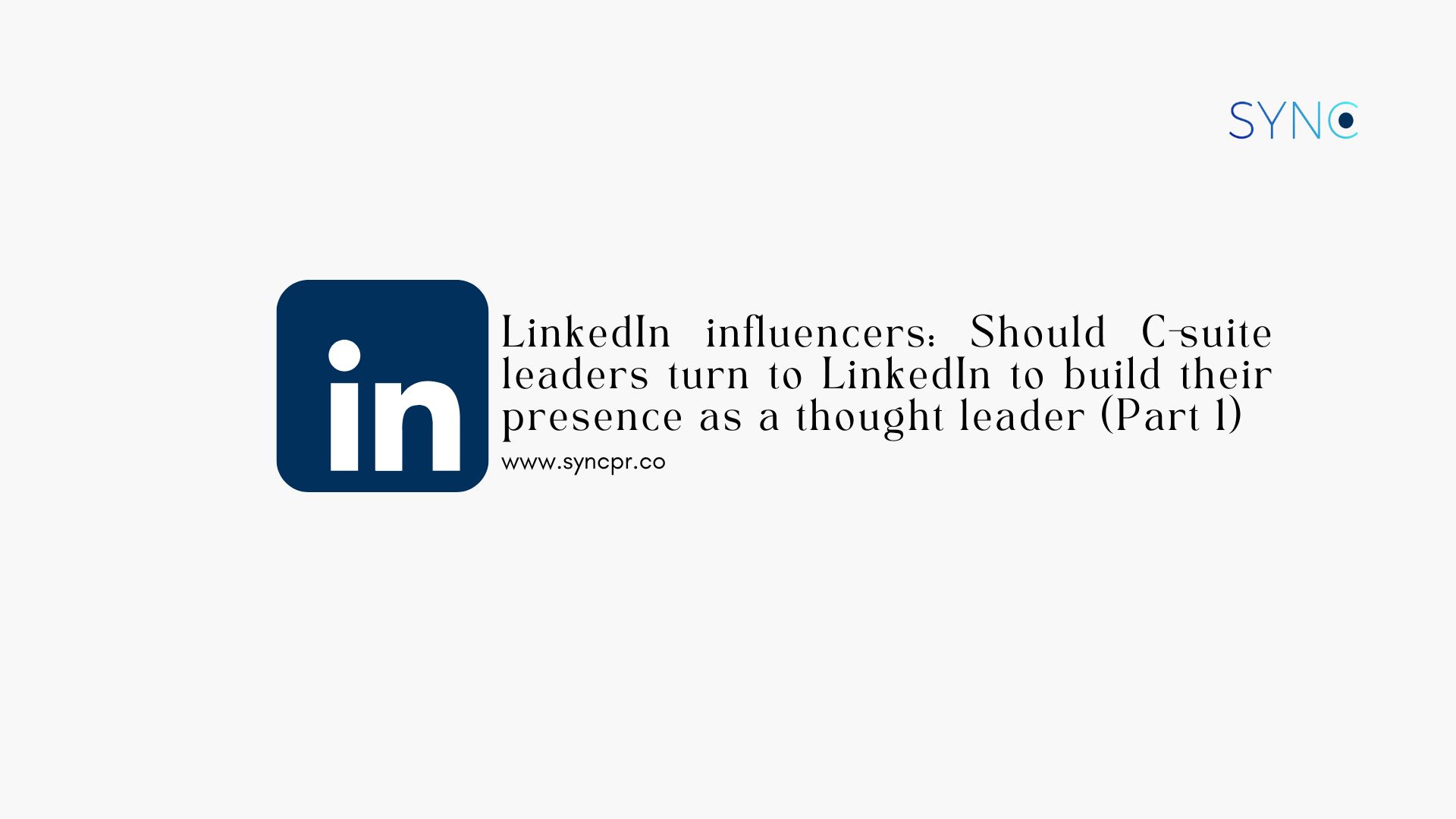Do LinkedIn influencers matter? The short answer is yes, they do.
In today’s digital age, the landscape of leadership and influence is rapidly evolving, prompting C-suite executives to reconsider their strategies for establishing authority and credibility within their industries.
With over 900 million members globally, LinkedIn has emerged as a powerful platform for professionals seeking to enhance their online presence and engage with a broader audience. For C-suite leaders, the question arises: should they leverage LinkedIn as a tool to cultivate their identity as thought leaders? Is worth being LinkedIn influencers?
The potential benefits are significant. As LinkedIn influencers, by sharing insights, expertise, and innovative ideas, executives can not only elevate their personal brand but also contribute to their organisation’s reputation and visibility. Furthermore, engaging directly with peers, stakeholders, and potential clients fosters meaningful connections and opens avenues for collaboration and growth.
However, the path to becoming a recognised thought leader on LinkedIn is not without its challenges. Executives must navigate the intricacies of content creation, audience engagement, and the delicate balance between personal and professional branding.
To avoid overwhelming you, I’ve broken this topic into two blog parts. Part one of the blog explores the benefits that drive C-suite executives to become LinkedIn influencers while part two explores the challenges, examples and strategy to building your presence as a thought leader on LinkedIn.
How LinkedIn influencers build credibility and drive strategic connections
LinkedIn continues to be the go-to network for professionals, especially with 91% of executives choosing LinkedIn as a platform for professional-related content. With more than 65 million decision-makers on the platform, the potential for strategic visibility and impact is unmatched. Let’s explore how leveraging LinkedIn benefits the modern C-suite.
- Enhance their reputations as thought leaders within their respective industries
C-suite executives wield significant influence within their respective industries, and leveraging LinkedIn as a platform for thought leadership can greatly enhance their professional reputation. By sharing insights, trends, and innovations relevant to their sector, these leaders can position themselves as authorities in their fields. This not only fosters trust among peers and stakeholders but also establishes a connection with a broader audience, including potential clients, partners, and future employees. A robust LinkedIn presence allows C-suite professionals to showcase their expertise and the values of their organisations, thereby reinforcing brand credibility and trust.
Moreover, being active on LinkedIn enables C-suite executives to engage with a diverse network of professionals, facilitating valuable conversations and collaborations. By participating in discussions, commenting on industry-related posts, and sharing their unique perspectives, these leaders can nurture relationships that may lead to strategic partnerships or potential business opportunities.
Additionally, as they contribute to the discourse in their industry, they can inspire and mentor the next generation of leaders, fostering a culture of knowledge sharing and continuous learning. Ultimately, by embracing their role as influencers on LinkedIn, C-suite professionals can drive both personal and organisational growth while significantly enhancing their visibility and impact in the marketplace.
- Unlock a multitude of strategic advantages for their organisations
By sharing insights, expertise, and thought leadership content, these leaders can effectively attract new partnerships, clients, and talent. The platform serves as a powerful tool for showcasing their vision and values, which can resonate with potential collaborators and clients seeking to align with like-minded organisations. Furthermore, a strong presence on LinkedIn allows C-suite executives to engage with their audience directly, fostering relationships that can lead to valuable business opportunities. This visibility not only enhances their personal brand but also elevates the reputation of their organisation in a competitive marketplace.

Additionally, C-suite executives who actively participate in discussions and share industry-specific knowledge can position their companies as thought leaders within their respective sectors. This perceived authority can be instrumental in building trust and credibility among stakeholders, including customers and investors.
Moreover, with the platform seeing 50 million users using the platform as a job-hunting tool, the curation of a professional image and consistent engagement with their connections can increase the chances of attracting top-tier talent who are eager to join a forward-thinking organisation. In a time when skilled professionals are highly sought after, demonstrating a commitment to innovation and industry leadership through social media can be a decisive factor in attracting the best candidates. Ultimately, the act of being a LinkedIn influencer not only benefits the individual executive but also drives significant value for the entire organisation.
- Increased likelihood of garnering interest from media publications
By sharing insights, thought leadership articles, and industry trends, these executives not only showcase their expertise but also position themselves as go-to sources of information and inspiration. This heightened online presence can lead to increased recognition from media publications, which are often on the lookout for credible voices to contribute to articles, interviews, and expert panels. As a result, C-suite leaders may find themselves receiving more inquiries from journalists and editors seeking their perspectives on pressing industry issues, thereby amplifying their influence and reach across various platforms.
This increased media coverage can amplify the executive’s voice, spread their message further, and ultimately contribute to their organisation’s strategic objectives. In essence, C-suite leaders who embrace their role as influencers on LinkedIn not only enhance their credibility but also open doors to valuable media interactions that can have a lasting impact on their professional journey and their organisation’s success.
The potential rewards of being LinkedIn influencers are too significant to ignore
The exploration of LinkedIn as an essential platform for C-suite leaders underscores the immense value it offers in establishing thought leadership. The advantages of bolstering both personal and organisational credibility, along with the opportunity to cultivate meaningful connections, are critical in today’s competitive landscape. Yet, the journey to becoming a prominent LinkedIn influencer is not without its challenges.
In part two, we will delve deeper into the nuances of cultivating an influential profile on LinkedIn. Expect to uncover practical strategies, address common hurdles, and draw inspiration from successful case studies that will empower C-suite executives on their path to becoming impactful LinkedIn influencers.
Stay tuned for invaluable insights that will pave the way for impactful digital thought leadership. Contact us hello(@)syncpr.co today to learn more about becoming LinkedIn influencers.

